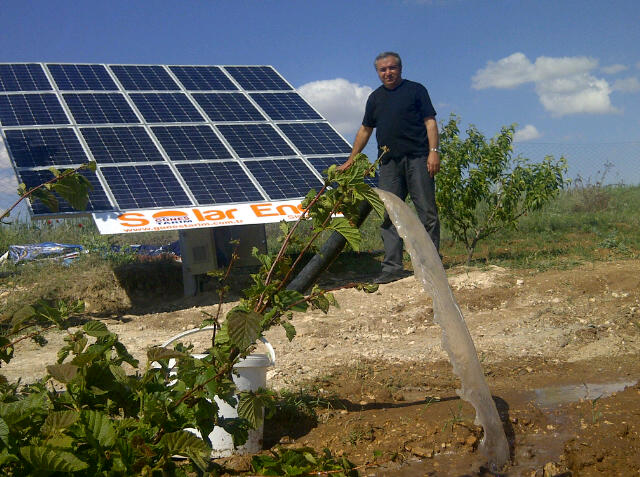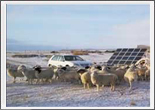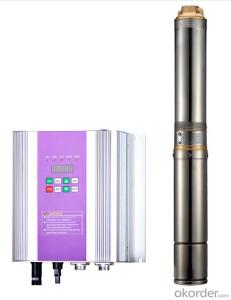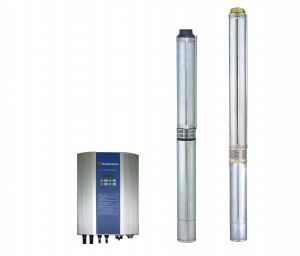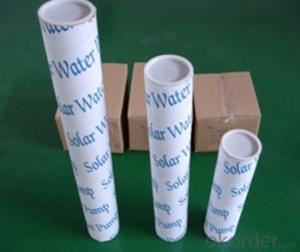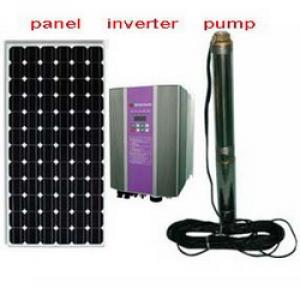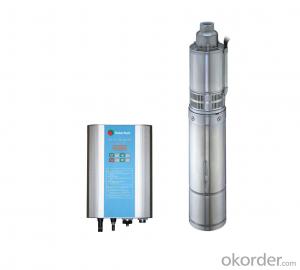Solar Energy Systems Alberta - DC Solar Pumps & DC Solar Pumping System
- Loading Port:
- Shekou
- Payment Terms:
- TT OR LC
- Min Order Qty:
- 20 set
- Supply Capability:
- 500000 set/month
OKorder Service Pledge
OKorder Financial Service
You Might Also Like
Product
Solar Water Pump is the pumping facility driven by solar energy, which consists of a solar pumping inverter and a pump. Solar water pumps kit is called solar pumping system combining with solar arrays designed according to different head and daily water flow for application. System is widely utilized for agriculture irrigation,desert control,pasture animal husbandry,city landscaping,daily water supply, etc.
In recent years, with the development of photovoltaic products from city application to huge demands of agriculture,pasture,desert areas, Solar Pond Pump has become the leading products combining photovoltaic industry with traditional industry such as agriculture water conservancy,desert control,daily water supply,city landscaping, etc.
Solar Pump driven by infinite solar energy, works from sunrise, and stops at sunset, need no connection to grid power nor diesel oil and battery. System can irrigate directly or store water instead of electricity in a reservoir. Solartech Solar fountain Pumps works with sprinkling irrigation, drip irrigation and infiltrating irrigation facilities, can be more efficient for water saving and dramatically lower the cost of using fossil energy.
Technical Features
♦ High efficient DC brushless motor requires less solar array. Rich social benefits.
♦ Optional centrifugal pump for big flow and helical rotor pump for high lift.
♦ High efficient semiconductor device used in main circuit. High reliability. Up to 98% conversion efficiency
of controller.
♦ Independent intellectual property of dynamic VI maximum power point tracking (MPPT) algorithm. Fast
response and good stability. 99% MPPT efficiency.
♦ Full automatic operation. Complete protection functions. Integrated with water level monitor to prevent
overflow and dry running.
♦ Full aluminum alloy case. IP52 protection grade. Ambient temperature: -20~+60℃.
Product Specifications
Model | Rated Power | Max. Flow | Max. Lift | Daily Water Supply | Outlet Dia. | Pump Dia. |
PSD600C | 600W | 4.5 m3/h | 30 m | 10 - 20 m3 | 1"1/4 | 4" |
PSD600H | 600W | 2 m3/h | 100 m | 5 - 10 m3 | 1"1/4 | 4" |
Solar Array Configuration
Max. Input Power | Max. Input Current | Max. Open Circuit Voltage | Recommended MPP Voltage |
1000W | 15A | 150VDC | 60 - 120VDC |
Recommended Design | Solar Panel | Connection | Total Power |
Configuration 1 | 190W / 35Vmp | 2 pcs x 2 strings | 760W |
Configuration 2 | 250W / 30Vmp | 3 pcs x 1 string | 750W |
Performance Curve
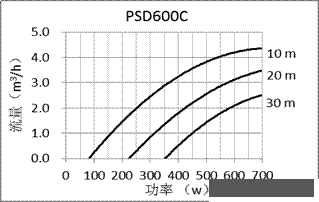
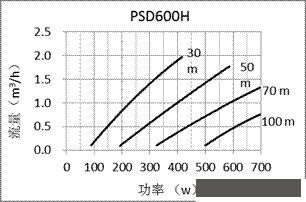
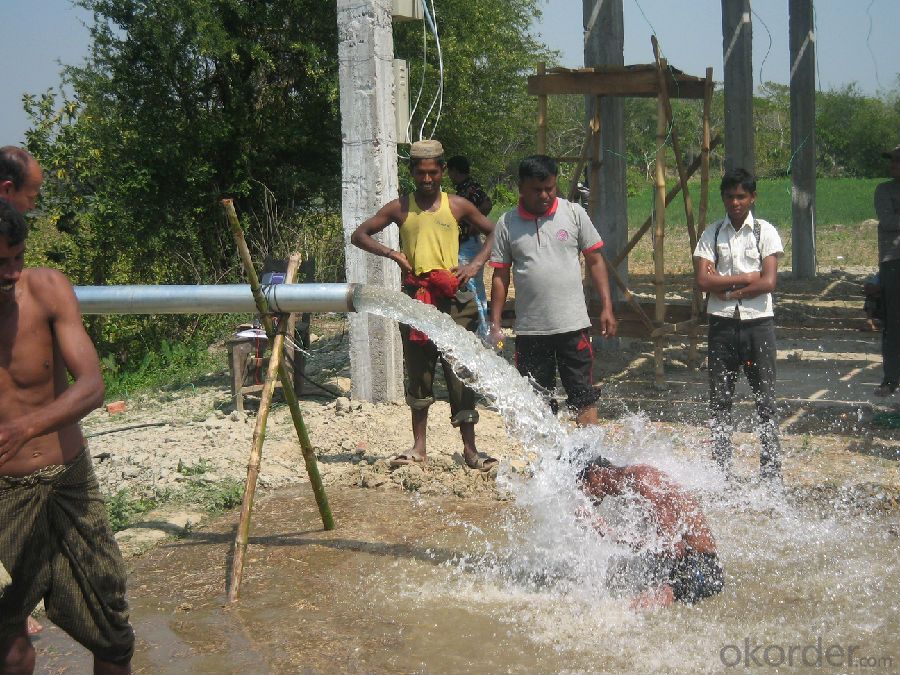
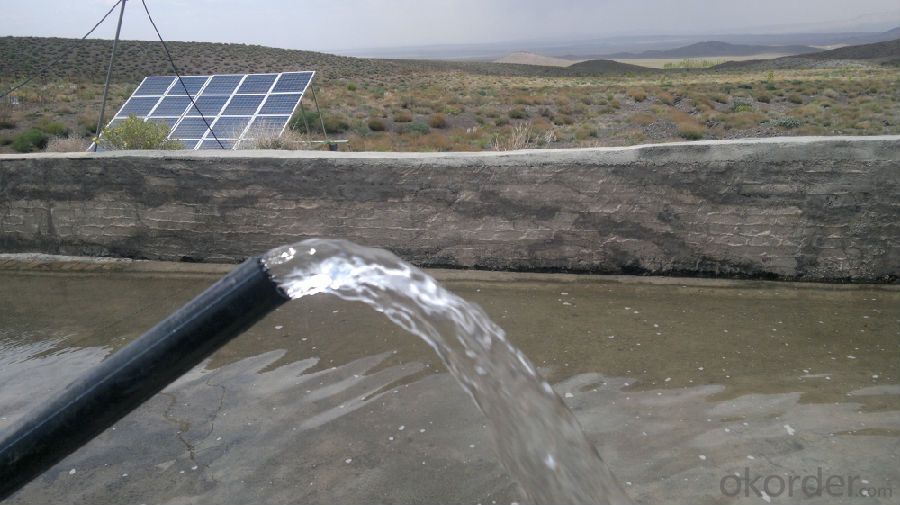
- Q: What is solar energy?
- Solar energy is the renewable form of energy derived from the sun's radiation, which is harnessed using various technologies such as solar panels or photovoltaic cells to convert sunlight into electricity or heat.
- Q: How do solar energy systems impact the stability of the electricity grid?
- Solar energy systems can have both positive and negative impacts on the stability of the electricity grid. On one hand, they can enhance grid stability by diversifying the energy sources and reducing reliance on fossil fuels. Solar energy is a renewable resource that can be harnessed locally, which can help in reducing transmission losses and increasing grid resilience. On the other hand, the intermittent nature of solar power can pose challenges to grid stability. Fluctuations in solar generation due to weather conditions can require grid operators to manage the variability through energy storage or flexible backup power sources. Overall, the impact of solar energy systems on grid stability depends on effective integration and coordination with existing power infrastructure.
- Q: What are the key components of a solar energy system?
- The key components of a solar energy system include solar panels, an inverter, a mounting system, batteries (optional), and a monitoring system.
- Q: Are there any risks of electrical shock with solar energy systems?
- Solar energy systems carry potential risks of electrical shock. While generally considered safe, these systems can be hazardous due to the presence of high voltages and electrical currents. Failure to handle or manage them properly can result in accidents. Several key risks are associated with solar energy systems: 1. Installation and maintenance: Improper procedures during the installation and maintenance of solar panels can lead to contact with live electrical components. This can happen when safety protocols are not followed or when untrained individuals attempt to handle electrical connections. 2. Equipment or wiring malfunctions: Defective inverters, wiring, or other equipment can increase the risk of electrical shock. Poor installation practices or insufficient maintenance can also result in electrical faults, exposing individuals to dangerous currents. 3. Fire hazards: While not directly related to electrical shock, faulty electrical components or wiring can raise the risk of fires in solar energy systems. Attempting to extinguish such fires without shutting down the electrical system first can further worsen the risk of electrical shock. To minimize these risks, it is essential to adhere to proper installation and maintenance procedures. This often involves seeking assistance from licensed professionals. Furthermore, individuals working with solar energy systems should be trained in safety protocols, including the use of appropriate personal protective equipment and ensuring proper grounding of electrical systems. Regular inspections and maintenance are also crucial to detect and address any potential electrical hazards.
- Q: What is the difference between a solar power purchase agreement (PPA) and a solar lease?
- A solar power purchase agreement (PPA) is a contract between a solar energy provider and a customer, where the customer agrees to purchase the energy generated by the solar panels at a predetermined rate over a fixed period of time. On the other hand, a solar lease allows the customer to lease the solar panels from a provider and pay a fixed monthly amount for the use of the equipment, without necessarily purchasing the energy generated. While a PPA involves buying the energy, a solar lease involves renting the equipment.
- Q: How much energy can a solar energy system produce in a day?
- The amount of energy that a solar energy system can produce in a day depends on various factors such as the size of the system, the location, weather conditions, and the efficiency of the solar panels. On average, a small residential solar energy system can produce around 10-12 kilowatt-hours (kWh) per day. However, larger systems or those located in regions with ample sunlight can generate significantly more energy, ranging from 20-30 kWh per day. It's important to note that solar energy systems do not produce energy during the night or on cloudy days, so the actual energy production will vary throughout the year. Additionally, the energy generated by a solar system can be stored in batteries for later use or fed back into the grid if the system is connected to the power grid.
- Q: Can solar energy systems be used in powering car charging stations?
- Yes, solar energy systems can definitely be used to power car charging stations. In fact, many car charging stations around the world are already powered by solar energy. Solar panels can be installed on the roof or nearby the charging station, which then captures sunlight and converts it into electricity. This renewable energy can be used to charge electric vehicles (EVs) without relying on the traditional power grid. Solar-powered car charging stations offer several advantages. Firstly, they provide a sustainable and clean source of energy, reducing carbon emissions and the overall environmental impact of EVs. Secondly, they can be installed in remote or off-grid locations where it may be challenging or expensive to connect to the electrical grid. This makes solar-powered charging stations particularly beneficial for rural areas or highways that lack easy access to electricity. Furthermore, solar energy systems can be designed to include battery storage, allowing the excess energy generated during the day to be stored and used during the night or during times of high demand. This ensures a continuous and reliable source of power for car charging stations, even when sunlight is not available. Although the initial installation cost of solar energy systems may be higher compared to traditional power sources, they generally have lower operating and maintenance costs in the long run. Additionally, there are various government incentives and rebates available to promote the use of renewable energy, which can help offset these initial costs. Overall, solar energy systems are a viable and sustainable solution for powering car charging stations, offering environmental benefits, energy independence, and cost savings in the long term.
- Q: Can a solar energy system increase the value of my home?
- Your home's value can be increased by installing a solar energy system. Potential buyers view this as a valuable investment due to the financial and environmental advantages it offers. One benefit is that solar panels can significantly decrease or even eliminate your monthly electricity bills, which is appealing to prospective homeowners. This leads to long-term savings for the new owners, making the property more attractive. Additionally, solar panels are considered an eco-friendly and sustainable energy solution, which is becoming increasingly important to many homebuyers. As the world moves towards a more environmentally conscious future, properties with solar energy systems are seen as highly desirable and can attract a wider range of potential buyers. Studies have proven that homes with solar panels sell faster and at higher prices compared to similar properties without them. The Lawrence Berkeley National Laboratory conducted research that revealed homes equipped with solar panels typically sold for an additional $15,000 compared to those without solar. This demonstrates that solar energy systems can indeed increase the value of your home and provide a return on investment. It is important to consider various factors, such as the size and efficiency of the solar energy system, the local real estate market, and the overall condition of your property, as these will determine the extent of the value increase. Seeking advice from a real estate professional who specializes in sustainable homes can provide you with more precise information regarding the potential value increase of your home. In conclusion, installing a solar energy system can enhance your home's value by reducing energy costs, appealing to environmentally conscious buyers, and potentially selling at a higher price. With the increasing focus on renewable energy, investing in solar power can be a wise decision that not only benefits you financially but also contributes to a greener future.
- Q: Can solar energy systems be used for powering outdoor surveillance cameras?
- Yes, solar energy systems can be used to power outdoor surveillance cameras. Solar panels can be installed to capture sunlight and convert it into electricity, which can then be used to power the cameras. This eliminates the need for traditional power sources and allows for continuous surveillance even in remote or off-grid locations.
- Q: Can solar energy systems be used in areas with limited roof space due to chimneys or vents?
- Yes, solar energy systems can still be used in areas with limited roof space due to chimneys or vents. In such cases, alternative installation options like ground-mounted solar panels, solar canopies, or solar pergolas can be considered. These options allow for the utilization of unused land or outdoor spaces to generate solar energy, making it possible to harness solar power even in areas with limited roof space.
Send your message to us
Solar Energy Systems Alberta - DC Solar Pumps & DC Solar Pumping System
- Loading Port:
- Shekou
- Payment Terms:
- TT OR LC
- Min Order Qty:
- 20 set
- Supply Capability:
- 500000 set/month
OKorder Service Pledge
OKorder Financial Service
Similar products
Hot products
Hot Searches
Related keywords






